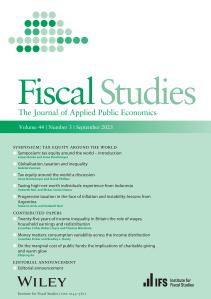I see nothing objectionable in fixing a limit to what anyone may acquire by mere favour of others, without any exercise of his faculties, and in requiring that if he desires any further accession of fortune, he shall work for it.” That, from John Stuart Mill, alongside his conviction that great economic and social advantages would result from a reduction in the number of “enormous fortunes which no one needs for any personal purpose but ostentation or improper power”, has for more than a century been the central liberal case for a substantial and effective inheritance tax.
The logic appears compelling. Gifts and inheritances come not as a result of effort or desert, but rather of blind luck. They reduce the incentive of the lucky recipient to work hard. They concentrate both economic and political power in an undeserving elite.
As we enter a second gilded age of great wealth inequality and the accumulation of great fortunes, Mill’s case is surely at least as relevant today as it was in the 19th century. Yet across the western world there are few taxes as unpopular as inheritance tax. Sweden and Norway, often considered beacons of social democracy and equality, have abolished their inheritance taxes entirely. Estate taxation in the United States has produced the rallying cry “no taxation without respiration”, surely the best fiscal slogan since the Boston Tea Party. And just last week an all-party parliamentary group on inheritance and inter-generational fairness proposed that the current 40 per cent rate of inheritance tax should be replaced by a tax of just 10 per cent levied on receipts of gifts and inheritances, rising to 20 per cent on sums over £2 million.
Why? The force of Mill’s arguments is surely undeniable. Looked at from the perspective of the recipient generation, inheritances appear random, unjust, an obvious basis for taxation. Looked at from the perspective of the bequeathing generation, though, bequests appear simply as an exercise in property rights. I have earned, and paid my taxes, and saved; it is my right to dispose of my assets as I see fit, and in particular to support my children. Few human emotions run deeper.
That is a genuine clash of ethical frameworks. No chance of solving that particular conundrum today.
Vested interests also muddy the political waters. Those with plenty of wealth are not averse to lobbying against its taxation. There is a third issue too — one of practicality. People will go to considerable lengths to avoid inheritance tax. They’ll even go as far as not dying. On July 1, 1979, Australia abolished federal inheritance taxes. There was a dip in the number of deaths in the last week of June as thrifty Aussies hung on to life for just a little longer to ensure their heirs could inherit tax-free.
More prosaically, in the UK those with serious wealth find all sorts of ways of paying nothing like 40 per cent tax on their bequests. On average, those leaving estates valued between £1 million and £8 million pay 20 per cent of what they leave in tax; those with estates of around £10 million pay just 10 per cent. It is reported that when the Duke of Westminster passed away in 2016 no inheritance tax was payable on the greater part of an estate worth more than £8 billion. What should be the most progressive tax around turns out to be regressive, at least among those estates that pay it. It is also an administrative burden on families where no tax is eventually payable. Each year more than 270,000 inheritance tax forms have to be filed on death, but fewer than 25,000 actually have any tax to pay.
If most of your wealth is tied up in your home, there is relatively little you can do to avoid inheritance tax. If you have serious money, then avoidance is not hard at all. The simplest expedient is to give away your assets more than seven years before you die. Or you can buy agricultural land, on which no inheritance tax is payable, or various kinds of business assets, or you can make clever use of trusts. Or if you have special “foreign dom” status you will not pay. A good lawyer will save your heirs a lot of money. All of which makes the tax’s great unpopularity more comprehensible even to those who take Mill’s view of the ethics.
And so we return to that parliamentary report. If you think that an effective system of taxing gifts and inheritances is important, you are left with two options. First, try to make the current system, or something like it, work; close as many loopholes as you can, and stick to the 40 per cent tax. The MPs’ conclusion is that this won’t work. The incentive to avoid is too great and the game of cat and mouse between tax authority and the wealthy one that the HMRC is bound to lose.
Hence their solution: do away with nearly all the reliefs and allowances and impose a flat tax, at a low rate of perhaps 10 per cent, on receipt of inheritances above the current £325,000 allowance, and on lifetime gifts of over £30,000. The rate would rise to 20 per cent for inheritances over £2 million. Their bet is that at rates like that, the incentive to invest time and effort in avoidance would all but disappear. They would also abolish that egregiously inefficient and inequitable element of the capital gains tax which results in full forgiveness at death.
We need an inheritance or gifts tax system that works far better than the current one, and which is more effective and equitable, and commands public support. Maybe following the all-party group’s recommendations would amount to throwing in the towel. But maybe it is the best we can do. For sure, the status quo with all its burdensome inequities should not be allowed to persist.
This article originally appeared in The Times and is used here with kind permission.









